In all countries, some face barriers that prevent them from participating fully in political, economic, and social life. These people may be excluded by legal systems, land, and employment opportunities. They are also excluded by discriminatory attitudes, beliefs, or perceptions.
The disadvantage is often based on gender, age, location, occupation, race, ethnicity, religion, citizenship, disability, and sexual orientation, and gender identity, among other factors. This type of social exclusion deprives people of dignity, security, and the opportunity to lead better lives.
With this in mind, it is worth noting that one of the most acute problems in our country, Colombia, is that of social inclusion.
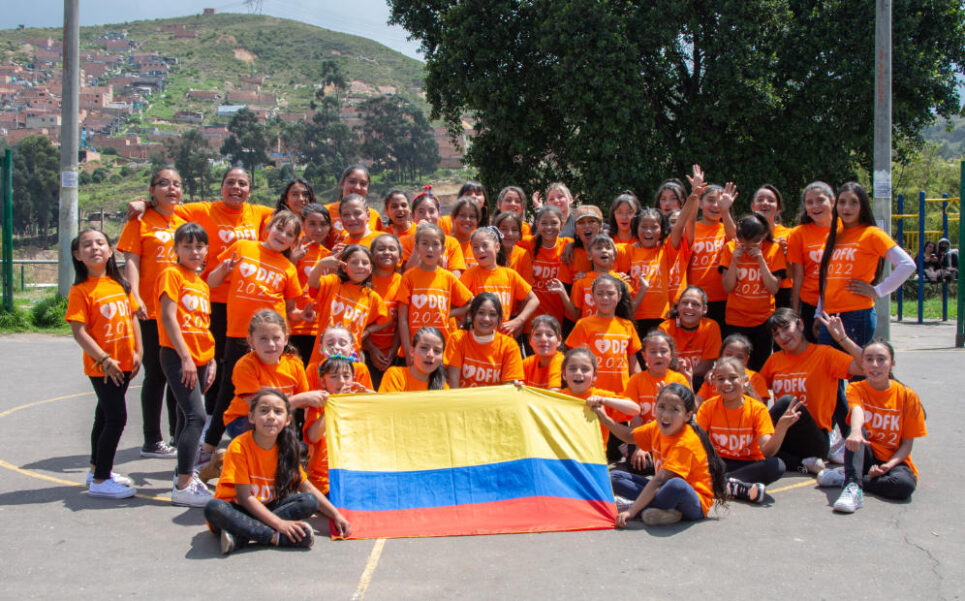
One of our government’s great challenges is confronting gender inequality. We must make it clear that Colombia promotes a preventive approach and promotes human development in international scenarios that deal with the welfare and development of minors.
More than 11 million people in the country are between 14 and 26 years of age, which is about a quarter of the population. In international forums, Colombia recognizes these young people as key actors in development, encouraging their participation and human capital formation.
Definition
Let us clarify that social inclusion is defined as everyone’s access to education, health services, job opportunities, housing, security, etc.
In 1990, UNESCO’s World Declaration on Education for All recognized the need to eliminate educational disparity, particularly in groups vulnerable to discrimination and exclusion (including girls, the poor, working and street children, rural population, ethnic minorities, populations with disabilities and other groups), to seek the universalization of education.
Since this Declaration, the concept of Education for All (EFA) has been promoted by UNESCO and other international cooperation agencies as the ideal of a world in which all children have access to and are guaranteed to receive a quality education.
The Foundation
This is how we came to the foundation niñas de la luz. A non-profit foundation that develops group individual and personalized mentoring programs for girls between the ages of 5 and 17, who are in a situation of social vulnerability.
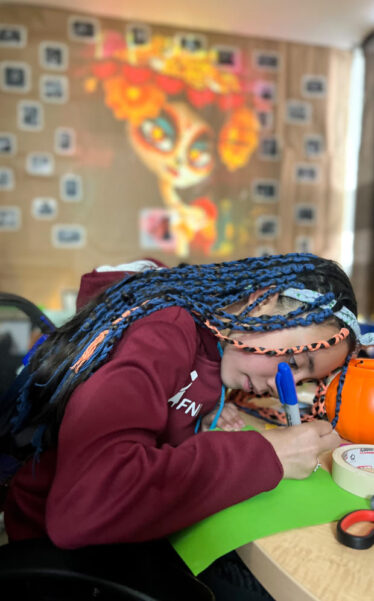
The idea is to inspire these girls to achieve a better quality of life.
Also, to have a better society through the example of volunteers (mentors), who come together to leave a positive footprint on each of our beneficiaries and their families.
I had the opportunity to speak with its founder Luz Bonilla.
Let’s start by saying that Luz Bonilla is an amazing woman. She is what we call a “berraca”. She is a public accountent and then specialized in development.
She is a native of Ciudad Bolivar, a “complicated” neighborhood of the Colombian capital.
We must emphasize that Ciudad Bolivar is one of the most unequal localities in Bogotá. It is marked by state neglect and the violation of economic, social, cultural, and environmental rights.
The work they do in Chocó includes both girls and boys since there are not many of them and the needs are immense.
Laura Viera A.: Is there anyone who has marked you in your life?
Luz Bonilla, founder of Fundación Niñas de Luz: Yes. There are two women. My mother and my mentor.
Her mentor taught her that it was possible to get out of my immediate world, out of Cuidad Bolivar in Bogota. She made sure that she wrote in a notebook all her dreams. Not only those incredible and colorful dreams, full of adventure and magic. But also dreams like graduating from school, speaking another language, getting to know another country, and having their own house and family the last dream they wrote down was to go to Paris and touch the Eiffel Tower.
Laura Viera A.: Why was the foundation born?
Luz Bonilla, founder of Fundación Niñas de Luz: The foundation was born because I had these experiences, all these experiences in my life. My mentor marked me a lot and the last teaching she gave me had three points: not to forget where I am from (never to feel ashamed for being Colombian), not to forget to help other girls who will surely need it, and not to lose my essence.
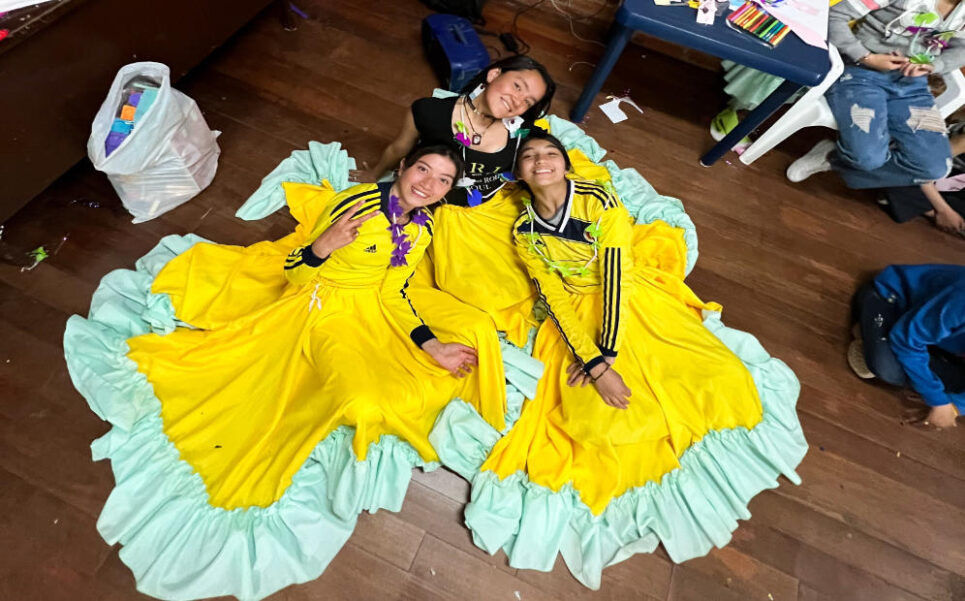
Laura Viera A.: Does the name have any special meaning, besides your name?
Luz Bonilla, founder of Fundación Niñas de Luz: Yes. The name of the foundation coincided with mine, but that is not the reason behind it. Those who gave the name to the foundation were the five girls we started working with. Their mothers are behind bars and when the girls went to visit their mothers they told them that they illuminated the place where they were imprisoned and they also wanted to be a light in the community where they were from.
The girls can choose from several clubs: politics, science, reading, visual arts, dance, and English.
The idea is that through these schools all of the girls’ human and technical skills will be fostered and encouraged.
They need to listen to and support each of their dreams. But, more important is to support them so that they become a reality through work, discipline, and motivation.
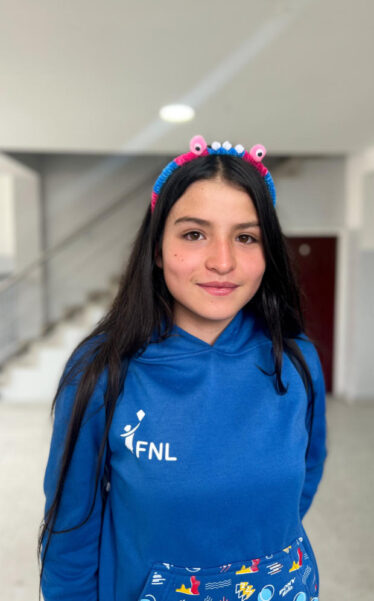
Reading Club: to develop in the girls the habit of reading, focusing on critical thinking, good spelling, and public speaking.
School of Scientists: to develop a spirit of research and a taste for learning the exact sciences.
English School: learning a universal language that will allow them to acquire more knowledge and find new opportunities in the world.
School of the Arts: to develop in the girls the ability to express themselves in public and to recognize the beauty and importance of their bodies in all their contexts.
School of politics, leadership, and innovation: to awaken and cultivate in our girls an interest in knowing and caring for their rights, citizen participation in management, public and private positions, or through actions focused on the common good.
Laura Viera A.: What still needs to be achieved?
Luz Bonilla, founder of Fundación Niñas de Luz: Many things. I wish we had more capacity to be able to have more girls in the foundation. But one of the projects that we have not yet achieved is that of Funiluz Rural. That is a beutiful project because they want to be farmers, work the land and that is something we have not been able to achieve yet.
They want to inspire
The foundation hopes to have an impact on girls’ lives by example.
Laura Viera A.: So far, what has been the easiest and most difficult?
Luz Bonilla, founder of Fundación Niñas de Luz: The easiest thing is that the girls come to us and tell us that they want to do things. Undoubtedly, the most difficult thing is to tell the girls that at this moment they cannot enter the foundation and we have to put them on a waiting list. We have to do that because I want to be able to give quality service to all the girls and we do not have all the infrastructure at the moment.
They are an organization that inspires and educates by example. They want to be leaders in their lives through art, culture, sports, and education, and in the future by women and men who develop changes of equality and inclusion in Colombian society.
The four basic values for them are love, inclusion, tolerance, and solidarity.
It is necessary to give the best of each one, to know how to understand and accept others and their differences, to accept, respect, and work with people we admire as beings, diverse and unique, and to be united, collaborating mutually to contribute with our service to the construction of a better society.
The problem
According to DANE (National Administrative Department of Statistics), despite a significant reduction in the last decade, in 2018, poverty levels reached 27%. This means that in 2018, 13.1 million people were living below the poverty line. Likewise, 39.8% of people belonging to the vulnerable class, were at risk of falling into poverty.
It is important to keep in mind that discrimination against children and adolescents is also evident in inequality and mistreatment for reasons of ethnicity, religion, gender, or even nationality.
Likewise, Colombia encourages discussions, the creation of alliances, and the generation of commitments in Comprehensive Early Childhood Care, since this approach allows the reduction of gaps and inequalities from the early stages of individuals, as well as the enhancement of the human development of its population.
Importance of social inclusion
Social inclusion is much more than a fashionable topic. There is a real importance to it.
People who are at risk of discrimination are often affected and made vulnerable by a specific turning point in their lives. These may be natural disasters, armed conflict, displacement, violence, or an economic crisis.
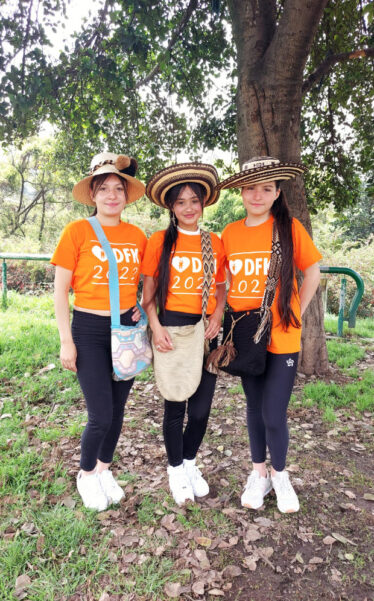
Social inclusion is an important concern and is part of the commitments of international organizations such as the United Nations (UN), because it affects entire groups around the world, due to the correlation it has with economic development.
For social inclusion to exist, there needs to be an understanding of the benefits it brings and a deep respect for all individuals in society. This in turn is supported by laws and enforcing them with effective oversight mechanisms.
The Niñas de Luz Foundation works with girls from 5 to 17 years of age, in a state of vulnerability, inhabitants of marginalized areas of the city of Bogotá, and with girls and boys in Puerto Echeverry (Chocó) – Colombia.
The idea is to generate a positive change of equality and inclusion in Colombian society.
The Fundación niñas de luz was born from the life experience of its founder.
Laura Viera A.: How did your personal experience mark the creation of the foundation?
Luz Bonilla, founder of the Fundación Niñas de Luz: I frame it in the sense that I lived those experiences firsthand. And, if it had not been for my mother and mentor, I would never have achieved all that I have achieved. Her teachings marked and guided me.
Officially the Foundation was constituted on July 27, 2015. The main purpose is to make the girls leaders of their own lives.
If that goal is achieved, they will be women who contribute positively to new generations from their condition and example of life.
Education is not a privilege
Inclusive education is a strategic approach designed to facilitate successful learning for all children and youth. It refers to common goals to decrease and overcome all types of exclusion from the perspective of the human right to education; it is about access, participation, and successful learning in quality education for all.
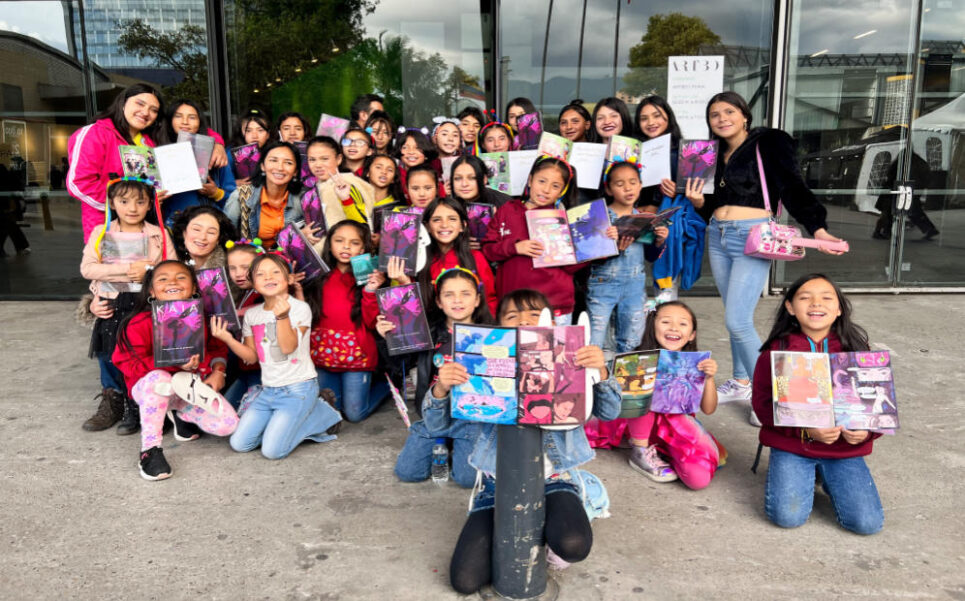
Laura Viera A.: How do you see the education system in Colombia?
Luz Bonilla, founder of Fundación Niñas de Luz: Well, look, I will answer you from what I see in the foundation, daily with the girls. The academic levels are low. The quality of public education in Colombia is not good. Basic things like reading comprehension, subjects related to mathematics, and English, are areas in which I see a great lack. Additionally, there is no academic orientation toward what they can choose to do when they finish their studies. Nobody talks to them about the National University, only about SENA, which although it is a great institution and option, is not the only one.
Laura Viera A.: Is education in Colombia a privilege or a right?
Luz Bonilla, founder of Fundación Niñas de Luz: Well, here in Colombia everyone has the right to education. What happens is that it is a privilege to have a good education. That is the difference, that is the problem.
Inclusive education means that all children and young people, with and without disabilities or difficulties, learn together in the various regular educational institutions (preschool, college/school, high school and universities) with appropriate supports.
More than the type of educational institution they attend, it has to do with the quality of the experience; and with how their learning, achievement, and full participation in the life of the institution is supported.
Concluding
Culture and cultural heritage are kept alive in everyday life, reproducing themselves from generation to generation, making the differential that allows territories to think sustainably.
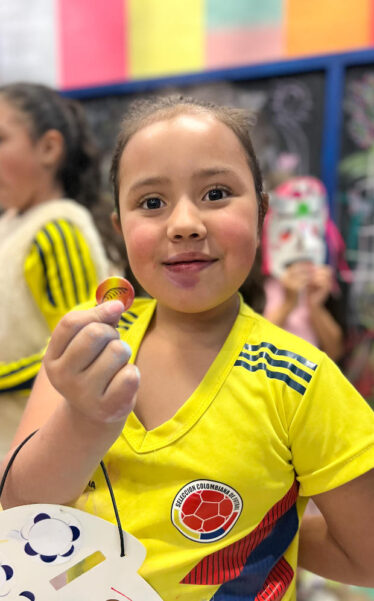
Education also has a social reason. To access knowledge, and learning techniques, and develop skills and confidence to shape and transform communities.
Social inclusion refers to citizenship, to civil and political rights, making a positive contribution to society, to having opportunities and access to work.
Being included is not exclusive to schools but is a specific form of participation in society, as a fundamental basis for survival in a competitive labor market.
Students cannot be considered included until they acquire the necessary skills to participate in society and employment.
After having the opportunity to speak with Luz I was very inspired and tremendously eager to help and support them. By giving these girls support and guidance, we are allowing them to improve their current lives and plant the seeds for their future.


